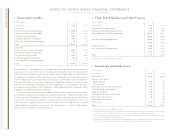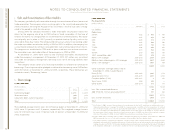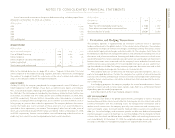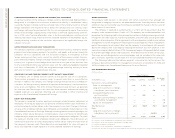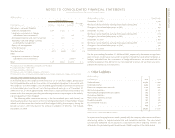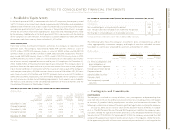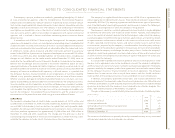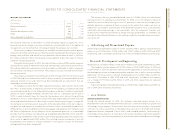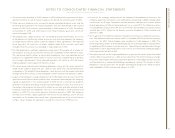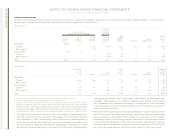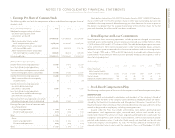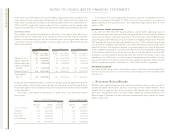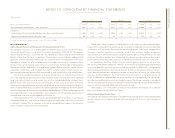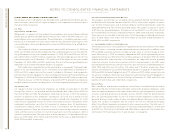IBM 2004 Annual Report Download - page 72
Download and view the complete annual report
Please find page 72 of the 2004 IBM annual report below. You can navigate through the pages in the report by either clicking on the pages listed below, or by using the keyword search tool below to find specific information within the annual report.
NOTES TO CONSOLIDATED FINANCIAL STATEMENTS
International Business Machines Corporation and Subsidiary Companies
70
ibm annual report 2004
settlement of some claims, and a stipulated remedy on remaining claims if plaintiffs prevail
on appeal. Under the terms of the settlement, the judge will issue no further rulings on
remedies. This settlement, together with a previous settlement of a claim referred to as the
partial plan termination claim resulted in the company taking a one-time charge of $320 mil-
lion in the third quarter of 2004.
This agreement ends the litigation on all claims except the two claims associated with
IBM’s cash balance formula. The company will appeal the rulings on these claims. The com-
pany continues to believe that its pension plan formulas are fair and legal. The company
has reached this agreement in the interest of the business and the company shareholders,
and to allow for a review of its cash balance formula by the Court of Appeals. The com-
pany continues to believe it is likely to be successful on appeal.
The agreement stipulates that if the company is not successful on appeal of the two
remaining claims, the agreed remedy will be increased by up to $1.4 billion—$780 million
for the claim that the company’s cash balance formula is age discriminatory, and $620 mil-
lion for the claim that the method used to establish opening account balances during the
1999 conversion discriminated on the basis of age (referred to as the “always cash balance”
claim). The maximum additional liability the company could face in this case if it is not success-
ful on appeal is therefore capped at $1.4 billion.
In the coming months, class members will receive formal notice of the settlement and
the judge will hold a fairness hearing. Once the settlement is approved, IBM will appeal
the liability rulings for the cash balance claims. As a result, the entire process could take
up to two years before reaching final conclusion.
The company is the defendant in an action brought by Compuware in the District
Court for the Eastern District of Michigan in 2002, asserting causes of action for copyright
infringement, trade secret misappropriation, Sherman Act violations, tortious interference
with contracts and unfair competition under various state statutes. The company asserted
counterclaims for copyright infringement and patent infringement in the Michigan action.
The court ruled that the company’s patent claims against Compuware will be addressed in
a separate trial, which has not yet been scheduled, and granted Compuware’s motion to
dismiss the company’s copyright infringement claims on summary judgment. The court
granted in part and denied in part the company’s motion for summary judgment dismiss-
ing Compuware’s antitrust claims. Trial began during the week of February 14, 2005. The
company has also asserted patent infringement claims against Compuware in a separate
action that the company brought in the District Court for the Southern District of New York
in January 2004.
The company is a defendant in an action filed on March 6, 2003 in state court in Salt
Lake City, Utah by The SCO Group. The company removed the case to Federal Court in
Utah. Plaintiff is successor in interest to some of AT&T’s Unix IP rights, and alleges copyright
infringement, unfair competition, interference with contract and breach of contract with
regard to the company’s distribution of AIX and contribution of unspecified code to Linux.
The company has asserted counterclaims, including breach of contract, violation of the
Lanham Act, unfair competition, intentional torts, unfair and deceptive trade practices,
breach of the General Public License that governs open source distributions, patent
infringement, promissory estoppel and copyright infringement. Trial was scheduled for
November 1, 2005 but the scheduling order has been suspended and is under revision.
On June 2, 2003 the company announced that it received notice of a formal, nonpub-
lic investigation by the Securities and Exchange Commission (SEC). The SEC is seeking
information relating to revenue recognition in 2000 and 2001 primarily concerning certain
types of client transactions. The company believes that the investigation arises from a sep-
arate investigation by the SEC of Dollar General Corporation, a client of the company’s
Retail Stores Solutions unit, which markets and sells point-of-sale products.
On January 8, 2004, the company announced that it received a “Wells Notice” from
the staff of the SEC in connection with the staff’s investigation of Dollar General
Corporation, which as noted above, is a client of the company’s Retail Stores Solutions unit.
It is the company’s understanding that an employee in the company’s Sales & Distribution
unit also received a Wells Notice from the SEC in connection with this matter. The Wells
Notice notifies the company that the SEC staff is considering recommending that the SEC
bring a civil action against the company for possible violations of the U.S. securities laws
relating to Dollar General’s accounting for a specific transaction, by participating in and
aiding and abetting Dollar General’s misstatement of its 2000 results. In that transaction,
the company paid Dollar General $11 million for certain used equipment as part of a sale
of IBM replacement equipment in Dollar General’s 2000 fourth fiscal quarter. Under the
SEC’s procedures, the company responded to the SEC staff regarding whether any action
should be brought against the company by the SEC. The separate SEC investigation noted
above, relating to the recognition of revenue by the company in 2000 and 2001 primarily
concerning certain types of client transactions, is not the subject of this Wells Notice.
In January 2004, the Seoul District Prosecutors Office in South Korea announced it had
brought criminal bid rigging charges against several companies, including IBM Korea and
LG IBM (a joint venture between IBM Korea and LG Electronics) and had also charged
employees of some of those entities with, among other things, bribery of certain officials of
government-controlled entities in Korea, and bid rigging. IBM Korea and LG IBM cooper-
ated fully with authorities in these matters. A number of individuals, including former IBM
Korea and LG IBM employees, were subsequently found guilty and sentenced. IBM Korea
and LG IBM were also required to pay fines. IBM Korea has been debarred from doing busi-
ness directly with certain government controlled entities in Korea. The orders, imposed at
different times, cover a period of no more than a year from the date of issuance. The
orders do not prohibit IBM Korea from selling products and services to business partners
who sell to government controlled entities in Korea. In addition, the U.S. Department of
Justice and the SEC have both contacted the company in connection with this matter.




